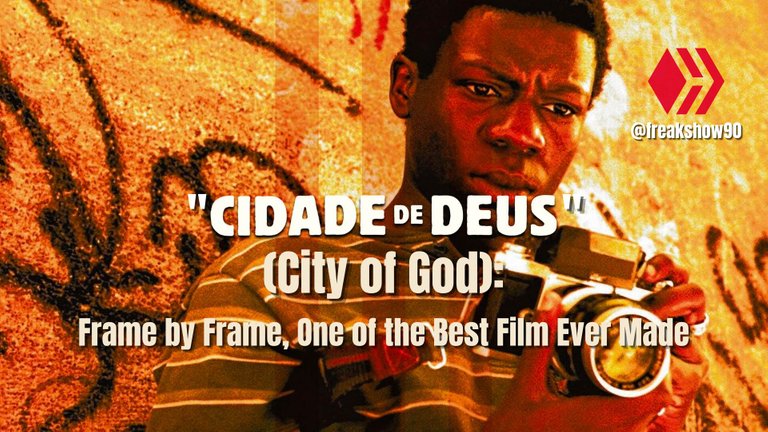
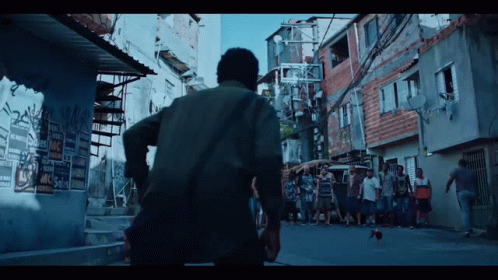
"Fight and you'll never survive... Run and you'll never escape", is a devastating motto and at the same time, an omen for this marvellous, incredible story, which, if not perfect, is there, on the verge. In this post I'm going to put a lot of emphasis on the perfection that is frame by frame, shot by shot, shot by shot, scene by scene. A real story, brought to the fiction offered by the seventh art, which at the same time shows the real history of violence, inequality, inequity and corruption of a huge country like Brazil, but which has close relations with its Latin American brothers in the region. This is extremely key to understanding "Cidade de Deus", a beautiful, human and absolutely raw film.
"Luchas y nunca sobrevivirás...Corre y nunca escaparás.", es un lema demoledor y al mismo tiempo, un presagio para esta historia maravillosa, increíble, y que si no es perfecta, está ahí, a punto. En este post voy a hacer mucho énfasis en la perfección que hay cuadro a cuadro, toma a toma, plano a plano, escena a escena. Una historia real, llevada a la ficción que ofrece el séptimo arte, que al mismo tiempo muestra la historia real de violencia, desigualdad, inequidad y corrupción de un país enorme como lo es Brasil, pero que guarda estrechas relaciones con sus hermanos latinoamericanos de la región. Esto es sumamente clave para entender "Cidade de Deus", una película preciosa, humana y absolutamente cruda.
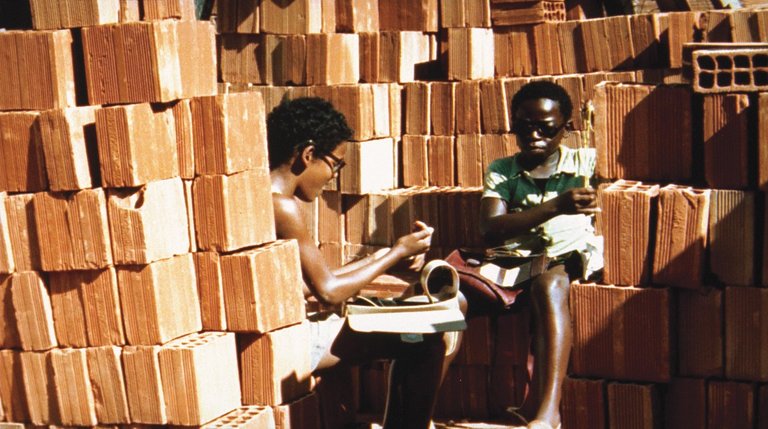

Now, the magic of this film is explained by the ability not to romanticise something as serious as violence, but neither to exaggerate the aspects in a sensationalist or sensationalist way. The best way to synthesise is precisely by showing reality as it is. A society that deliberately chooses to forget and segregate a large part of its population in the outskirts of Rio de Janeiro, these, in the face of the scarcity of opportunities, respect for the law, and above all inequality. The symptoms of poverty in this region of the world are not directly linked to the generation of wealth, but on the contrary, to the distribution of wealth. "Cidade de Deus" reveals a reality that each and every one of us sees (if you are from Latin America, even more so), but that we choose not to act upon...
A story, which we see in this film, where there are aspects that are tremendously sad. Generally speaking, almost most of the characters die. But not an unnecessary, forced, over-dramatisation. On the contrary, they do it (die) because it is the consequence of living in a society, covered in a culture of disaster and without leaving the logical destiny of that lifestyle. Drugs, abuse, witchcraft, excessive violence, rape, social castes, and a high degree of collective ignorance, is what underlies, can be smelled and felt when watching this film. Zé Pequeño, Buscapé, Mané, Cabaleira, and many other names illustrate the idea of this story, which nobly takes its name from a famous favela in the former capital of Brazil.
Ahora bien, la magia de esta película se explica por la capacidad de no romantizar algo tan grave como la violencia, pero tampoco exagerar los aspectos de un modo amarillista o sensacionalista. La mejor forma de poder sintetizar, es precisamente mostrando la realidad tal cual es. Una sociedad que decide, deliberadamente olvidar y segregar a gran parte de su población a las afueras de Río de Janeiro, éstos, ante la escasez de oportunidades, respeto a la ley, y sobre todo inequidad. Los síntomas de la pobreza en esta región del mundo, no están directamente ligados a la generación de riqueza, sino al contrario, a la distribución de la misma. "Cidade de Deus", revela una realidad que todos y cada uno vemos (si eres de América Latina, aún más) pero que decidimos no actuar...
Una historia, que vemos en esta película, donde hay aspectos que son tremendamente tristes. En líneas generales, casi la mayoría de los personajes mueren. Pero no un dramatismo innecesario, forzado, de más. Todo lo contrario, lo hacen (morir) porque es la consecuencia de vivir en una sociedad, cubiertos en una cultura del desastre y sin salir del destino lógico de ese estilo de vida. Drogas, abusos, brujería, violencia desmedida, violaciones, castas sociales, y un alto grado de ignorancia colectiva, es lo que subyace, se olfatea y se palpa al ver este film. Zé Pequeño, Buscapé, Mané, Cabaleira, y otros múltiples nombres ilustran la idea de esta historia, que noblemente coge su nombre de una favela famosa de la ex capital del Brasil.
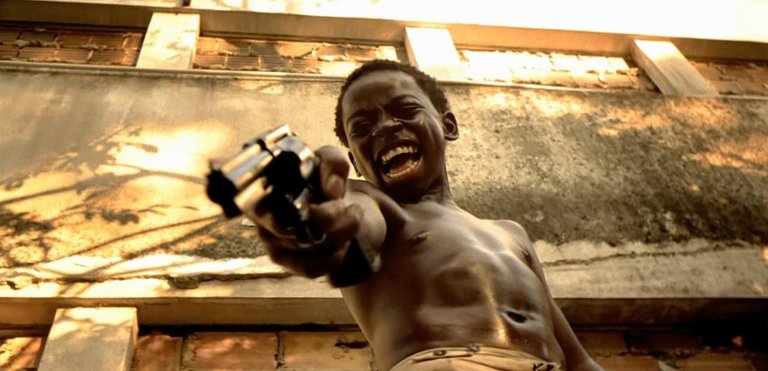
Likewise, at times (and this is a personal revelation) as a viewer, I have felt that during the course of this film, one does not really realise that it is an extremely cruel story. Why? Very simply, it is so well directed, that the common thread between each small shot, between interrelated stories, and during the development of the plot, we are not (or I am not capable) of realising that a whole generation of young people have been victims of this destructive scourge that I mentioned in previous lines. While, as an audience, we can sympathise with Buscapé's struggle to overcome, to judge and criticise Little Ze, for example, is to employ a dichotomy that does not explain the phenomena well.
Así mismo, por momentos (y esto es una revelación personal) como espectador, he sentido que durante el recorrido de esta película, realmente uno no se da cuenta que es una historia sumamente cruel ¿Por qué? Muy simple, está tan bien dirigida, que el hilo conductor entre cada pequeño plano, entre historias interrelacionadas, y durante el desarrollo del argumento, no somos (o no soy yo capaz) de darnos cuenta que toda una generación de jóvenes ha sido víctimas de este flagelo destructivo que mencionaba en líneas anteriores. Si bien, como audiencia, podemos simpatizar con la lucha de superación de Buscapé, juzgar y criticar a Ze Pequeño, por ejemplo es emplear una dicotomía que no explica bien el fenómenos.
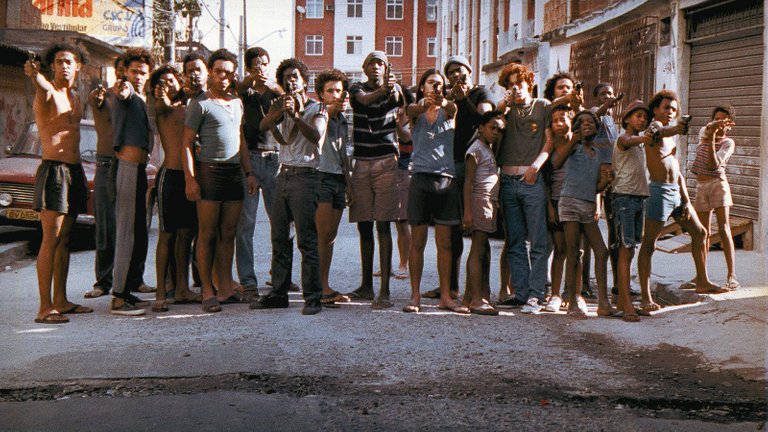
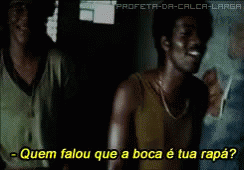
Sometimes, as a society, because of our cultural background, we project certain things that prevent us from seeing the bigger picture. And in these uncomfortable aspects of thinking, Cidade de Deus also comes in. Not only is it a demonstration of a Brazilian society that is damaged, consumerist, corrupt or downright inhuman to part of its own population, but it leads us to form judgements, to employ the always sterile but attractive mental exercise of: "What would I have done if I were one of them?" And not to understand the rawness that some human beings have to go through precisely because of other human beings who are totally oblivious to such things.
In other words, if you haven't seen this film, I definitely recommend that you do. It is available on Amazon Prime, but bear in mind that beyond the scenes of violence, rawness and humour, this film has a much more philosophical undertone. With a depth of criteria that, frankly, we should teach in universities. And not to mention if you love anthropology or sociology, it is almost an obligatory subject to see this piece of art. It's not easy for the biased, Anglo-Saxon and rather elitist world of Hollywood to look at you, and as a colourful fact, this feature film not only won an Academy Award, but it totally swept the bunch of festivals where it was shown.
A veces, como sociedad, debido a nuestro trasfondo cultural, proyectamos ciertas cosas que nos impiden ver el panorama completo. Y en estos aspectos incómodos del pensamiento, también entra Cidade de Deus. No sólo es una demostración de una sociedad brasileña dañada, consumista, corrupta o por tramo inhumana con parte de su propia población, sino que nos lleva a forma juicios, a emplear el siempre estéril pero atractivo ejercicio mental de: "¿Y yo qué hubiese hecho si fuese uno de ellos?" Y no a entender la crudeza que algunos seres humanos tienen que atravesar por culpa, precisamente, de otros seres humanos que son totalmente ajenos a esos menesteres.
En otras palabras, si no han visto esta película, indudablemente les recomiendo que lo hagan. Está disponible en Amazon Prime, pero eso sí, tengan en cuenta que más allá de las escenas de violencia, crudeza y humor, este film tiene un trasfondo que es mucho más filosófico. Con una profundidad de criterios, que francamente, deberíamos enseñar en universidades. Y ni hablar si amas la antropología o la sociología, es casi que una materia obligada ver esta pedazo de obra de arte. No es fácil que el mundo sesgado, anglosajón y bastante elitista de Hollywood voltee a verte, y como dato de color, este largometraje no sólo ganó un Academy Award, sino que arrasó totalmente en el montón de festivales donde estuvo expuesta.
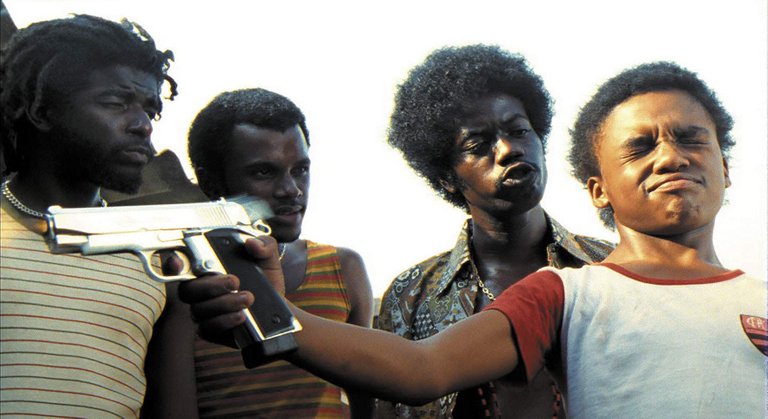

The critics love it, and I think they do because anyone who sees it understands that it is much more than what it shows. We all do mental exercises and apply different analyses to what we understand best fits the real message of this film. The narrative of this film, the pace of the script, the dynamism of the camera and the artistic and fascinating shots, are just some of the features you will see. Moreover, and this is a challenge to the audience that reads me, during the scene where the ellipsis of time is used to explain the origin of one of the key houses in the plot, we will see one of the most poetic resources to give the spectator an understanding of the passing of the years?
La crítica la ama, y creo que lo hace porque cualquier que la vea entiende que es mucho más de lo que muestra. Todos, hacemos ejercicios mentales y aplicamos distintos análisis para con lo que entendemos que se ajusta mejor al mensaje real de esta película. La narrativa de esta película, su ritmo de guión, el dinamismo de la cámara y los planos artísticos y fascinantes, son tan solo algunas de las características que verán. Además, y esto es un reto a la audiencia que me lea, durante la escena donde se emplea el elipsis de tiempo que explica el origen de uno de las viviendas claves dentro de la trama, veremos uno de los recursos más poéticos para dar a entender al espectador el paso de los años...
Beauty, pain, discomfort, humour, frustration, psychopathy (a lot, tons of this psychiatric condition), revenge, hate, poverty, extermination, fatalism, struggle, overcoming, companionship, empathy; and I could go on for several more paragraphs, but I really want to do justice to this film. I love that films dare to tell true stories in a way that is not exaggerated. Actors who have never acted before, and who are in this feature film, give a sense of discomfort and realism that makes your skin crawl. Poignant. In other words, and as it says in the title of this post, Cidade de Deus is for me one of the best films ever made. A milestone of the seventh art, and a jewel of human artistic creation. Judge for yourselves, dare to marvel at it.
Belleza, dolor, incomodidad, humor, frustración, psicopatía (muchísima, toneladas de esta condición psiquiátrica) venganza, odio, pobreza, exterminio, fatalismo, lucha, superación, compañerismo, empatía; y podría seguir por varios párrafos más, pero de verdad quiero hacer justicia a este film. Amo que las películas se atrevan a contar historias reales de un modo nada exagerado. Actores que jamás han actuado, y que están dentro de este largometraje, dan una sensación de incomodidad y realismo, que te eriza la piel. Conmovedor. En otras palabras, y como bien dice en el título de este post, Cidade de Deus, es para mí una de las mejores realizaciones que jamás se hayan hecho. Un hito del séptimo arte, y un joya de la creación artística humana. Juzguenla ustedes, atrévanse a maravillarse.
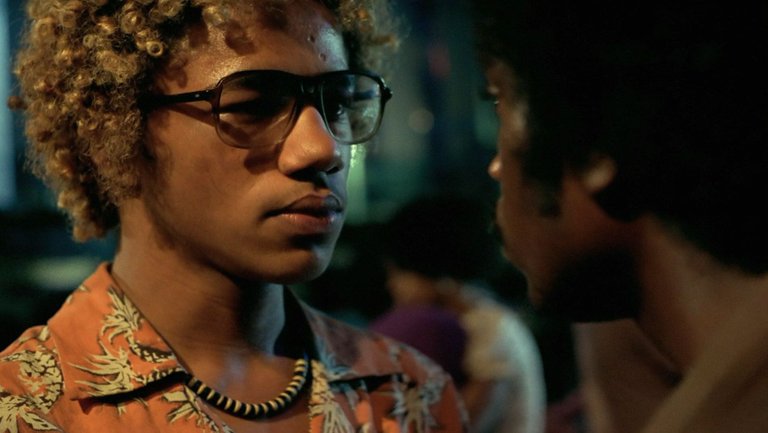
I was shocked by the crude and realistic way in which you show the violence of the armed forces in Brazil. I suggest you to improve the interaction within Hive in all the communities where you publish. You have to promote the blog and the best way is to make yourself known through the interaction with the publications of other users.
Yeah, you're absolutely right. I will do that. Thanks for reading my posts very often. Hope you loved it.
Recuerdo la primera vez que ví este film y pensé que era uno de los más violentos que he había visto, después al ver nuevamente pude cambiar la palabra violencia por realidad; lo fascinante de la historia es el relato de los muchos personajes que parecen en este film, todos afectados y motivados a alcanzar diferentes objetivos que le ayudarán de una u otra manera a sobrevivir en un lugar tan peligroso.
Ze Pequeño siempre lo he catalogado como uno de los mejores villanos en un film.
Me gustó mucho su reseña.
Muchísimas gracias, @nameless16. Y sí, comparto contigo que Zé Pequeño es increíble como personaje. Pero además, es la "carita desagradable" de aquella parte de la sociedad que no solemos prestar demasiada atención. Cidade de Deus es una belleza de película. Espectacular, cuadro a cuadro. Uno de los mejores films jamás realizados. Gracias, de nuevo, por tus palabras. Saludos.
He oído comentarios de personas que sin haber visto la película creen saber cómo es porque dicen, "ah sí, habla de las favelas" y con eso creen que basta. Para nada. Coincido contigo en que es una de las mejores películas jamás realizadas, el guión, la fotografía, la escenografía, el montaje, es a la vez una historia de iniciación y una denuncia social, una pincelada cultural y una película de acción, un thriller en el cual hay una historia de amor y en fin una experiencia cinematográfica única. Recomendadísima.
Excelente post!